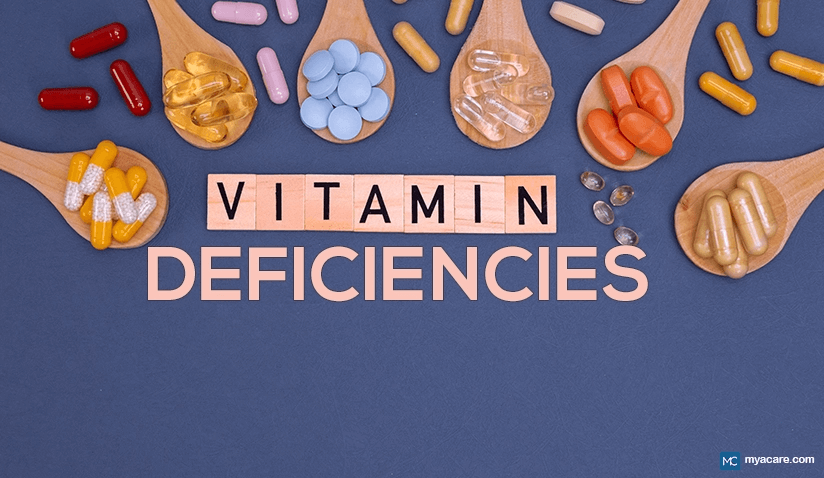Vitamin Deficiencies: Signs, Impact, and How to Prevent

Medically Reviewed and Updated by Dr. Rosmy Barrios - August 21, 2024
Vitamins are essential dietary nutrients that our body needs to function properly.
As micronutrients, they play a crucial role as coenzymes. Coenzymes bind to enzymes to metabolize macronutrients stored in the body. These macronutrients (carbs, fats and proteins) are used as fuel sources to meet the body's energy requirements.
If macronutrients are raw materials for energy products, then micronutrients act more like facilitators or catalysts that enable and regulate biological reactions. Macronutrients are like the fuel that provides the energy for the car’s engine, and the micronutrients act as spark plugs and lubricants, facilitating essential biochemical reactions and maintaining optimal performance. They ensure that energy from macronutrients is efficiently released and utilized. Hence, micronutrients are like accessory molecules that assist in enzyme function
Vitamin deficiencies occur when vitamin intake is inadequate, and the body struggles to perform critical functions optimally. While the body is remarkably adaptable, it can only compensate for these deficiencies for a limited time.
Prolonged deficiencies of essential vitamins can cause many health conditions and contribute towards aging and metabolic disorders. Early diagnosis and proper management are paramount to avoid the consequences of unaddressed nutrient deficiencies.
This article explores how the body adjusts to vitamin deficiencies and the potential consequences of not getting enough of these vital nutrients. It also offers tips for avoiding vitamin deficiency.
How Does Our Body Adjust to Vitamin Deficiencies?
Researchers are still attempting to understand the precise mechanisms behind how the body adapts to vitamin deficiencies. The body relies on various strategies to compensate for the lack.
The body tries to limit the odds of deficiency by storing the fat-soluble vitamins A, D, E, and K in fatty tissues and the liver.
Water-soluble vitamins are not held in the body and must be replaced regularly from the diet.[1] These include vitamin C and B vitamins.
The gut bacteria can produce B vitamins and vitamin K in minute quantities. However, these amounts are insufficient to compensate for the deficiency, and their presence still relies on a steady food supply.
Other mechanisms that the body might use to adapt during vitamin deficiency include:
- Enhancing vitamin uptake
- Conserving vitamin reserves
- Minimizing vitamin requirements
- Making use of alternative enzymes or vitamins
A few ways this may occur are described in more depth below.
Increased Absorption: One of the body's primary strategies to adapt to nutrient deficiencies is to enhance nutrient absorption. The body upregulates transporters and receptors responsible for nutrient uptake, allowing maximum utilization of even small amounts of these essential elements.
Example:
- When there's enough active vitamin D, the production of calbindin-D9k increases, enhancing the intestines' ability to absorb calcium efficiently.[2]
Mobilizing and Conserving Stores: Fat-soluble vitamins like A and D are stored in the body's tissues, providing a reservoir to draw upon during periods of deficiency. The body attempts to conserve these stored vitamins by decreasing their excretion and prioritizing their utilization for critical functions.
Example:
- Vitamin D deficiency can lead to the prioritization of basic metabolic functions, such as calcium absorption over bone mineralization.
Prioritising Gene Expression: When the body is deficient in a particular vitamin, it can downregulate the expression of non-essential genes that require that vitamin for its function. Lowered gene expression helps to conserve resources and prevent the accumulation of harmful metabolites.
Example:
- Vitamin A is essential for activating proteins called opsins that receive light and are crucial for vision. When vitamin A levels are low, the body downregulates gene expression for night vision.
- Some research suggests that the body prioritizes day vision over night vision. The rods (used for low light vision) in the eyes appear to be affected by vitamin A deficiency before the cones (light and color vision). This adaptation may preserve overall vision but also lead to night blindness.
Increasing Enzyme Activity: The body can also increase enzyme activity to enhance vitamin salvaging or recycling.
Example:
- When vitamin B12 levels are low, the body prioritizes its use for vital functions. One way it may achieve this is by increasing the activity of B12-dependent enzyme methionine synthase. This enzyme lowers homocysteine (a toxic metabolite) and helps to recycle B12, methionine, and folate (Vitamin B9).[3]
Changes in Protein Binding: The body may also change how proteins bind to vitamins. Altered protein binding can affect the activity of enzymes and other proteins used for vitamin handling.
Example:
- When vitamin D levels are low, the body increases the binding of vitamin D to a protein called vitamin D binding protein (DBP). High DBP conserves vitamin D and spares it from degradation while lowering its availability to the bones.[4]
Alternative Pathways: When a vitamin deficiency disrupts a specific biochemical process, the body can activate alternative enzyme pathways. These require different vitamins or nutrients to achieve the same goal.
Metabolic "rerouting" helps maintain essential functions, yet most alternatives are not nearly as efficient. They also often cannot be sustained for long periods.
Example:
- If vitamin B6 levels are insufficient for converting homocysteine to methionine, the body can activate a folate-dependent pathway to achieve the same outcome. The opposite can apply if folate is deficient; vitamin B6 can partially compensate.[5]
- Vitamin C is crucial for collagen synthesis. When vitamin C levels are low, the body may use other antioxidants, such as glutathione or glutamine, to modify collagen production methods with a lower efficiency.
Stress Response: The body's stress response temporarily elevates stress hormones, such as cortisol, which may help mitigate aspects of deficiency. Cortisol can block inflammation and pause various immune processes that may lessen the impact of a vitamin deficiency.[6]
Examples:
- Vitamins that may have otherwise countered inflammation as antioxidants in the bloodstream include vitamins C and E. Reducing inflammation lessens the requirements for these vitamins.
- Vitamin A helps establish immune tolerance to an antigen (foreign protein). A loss of tolerance results in allergy. Without vitamin A, the immune system is more reactive to detected antigens (foreign proteins). Cortisol may help prevent severe reactivity in the absence of vitamin A.
Harnessing Cellular Antioxidants: When a specific vitamin's level dips, the body can strategically leverage its network of cellular antioxidants to compensate for the missing vitamin's protective role.
Example:
- In low vitamin E situations, vitamin C may be used to recycle and conserve vitamin E[7], and vice versa.
As highlighted above, the body can expertly adapt to vitamin deficiencies and always maintain functionality. Despite these observations, these mechanisms are still under investigation to clarify how they work.
It is also important to remember that any adaptations the body makes are limited and often help cover temporary nutrient deprivation. Maintaining adequate vitamin intake through diet or supplementation remains crucial for optimal health.
Vitamin Deficiency Symptoms
Nutrient deficiencies manifest as various symptoms, depending on the specific nutrient involved and the severity.
Some general symptoms of vitamin deficiencies include:
- Fatigue and weakness
- Increased risk of infections
- Impaired immune function
- Digestive issues
- Dry skin
- Nail abnormalities
- Hair loss
- Anxiety and sleep disturbance
Vitamin deficiencies tend to progress through stages. The body initially adapts to low vitamin levels, making early symptoms subtle. Symptoms gradually worsen if left untreated as the body cannot sustain using alternative pathways.
The long-term consequences of unaddressed nutrient deficiencies can be severe. For instance:
- Vitamin D deficiency is known to elevate osteoporosis risk and lead to fractures.
- Severe vitamin A deficiency may precipitate allergies, night blindness, and reduced day or color vision.
- Vitamin K deficiency is associated with impaired blood clotting and increased bleeding risk.
- A lack of vitamin C causes scurvy, bleeding gums, chronic infections, and slower wound healing.
- B vitamin deficiencies can result in nerve damage, megaloblastic anemia, and malabsorption syndromes like Kwashiorkor disease.
It is crucial to consult with a nutritionist for a precise diagnosis to avoid suffering from chronic nutrient deficiencies.
Risk Factors
A few factors can raise the risk of acquiring vitamin deficiencies[8], such as:
- Inadequate intake of vitamins through diet
- Malabsorption due to health conditions like celiac disease or ulcerative colitis
- Older age, as our body's ability to absorb and utilize vitamins decreases with age
- Lack of sun exposure, which is necessary for the production of vitamin D
- Particular medications can hamper the absorption or utilization of vitamins
- Steeper nutritional requirements during pregnancy, lactation, or certain medical conditions.
- Higher metabolic losses due to chronic or acute stress, infections, chronic diseases, or certain medications.
- Genetic changes (polymorphisms) that affect nutrient absorption or metabolism.
Importance of Early Diagnosis and Management
A timely diagnosis and a proper protocol are crucial for managing and preventing the potentially detrimental effects of nutrient deficiencies. Routine appointments with a healthcare provider can help to promote early recognition of potential deficiencies.
Adequate nutrient levels can be restored and maintained with dietary changes and appropriate supplementation.
How Can We Prevent Vitamin Deficiencies?
The best way to prevent vitamin deficiencies is by sticking to a balanced diet plan that incorporates an assortment of vegetables, fruit, whole grains, legumes, and other lean proteins. Whole foods like these are abundant in vitamins and minerals. Their regular consumption can help ensure that the body gets all the essential nutrients.
In some cases, supplements may be necessary to address specific nutrient deficiencies. Those with widespread deficiencies may need to treat certain deficiencies before others to avoid consequences, such as refeeding syndrome.
Consult a healthcare expert for a safe and effective supplemental protocol for treating nutrient deficiencies.
Conclusion
Vitamins are vital to maintaining our overall health and well-being. Our body can adjust to vitamin deficiencies in the short term by using stored vitamins. However, if the deficiency persists, it can lead to long-term consequences. Consuming a balanced diet and consulting a nutrition expert is important if you experience any symptoms of vitamin deficiencies. By caring for our body's nutritional needs, we can ensure that it functions at its best and prevent the risk of developing vitamin deficiencies.
To search for the best doctors and healthcare providers worldwide, please use the Mya Care search engine.
The Mya Care Editorial Team comprises medical doctors and qualified professionals with a background in healthcare, dedicated to delivering trustworthy, evidence-based health content.
Our team draws on authoritative sources, including systematic reviews published in top-tier medical journals, the latest academic and professional books by renowned experts, and official guidelines from authoritative global health organizations. This rigorous process ensures every article reflects current medical standards and is regularly updated to include the latest healthcare insights.

Dr. Rosmy Barrios is an aesthetic medicine specialist with international work experience. She earned her physician diploma at the Universidad Del Norte’s School of Medicine in Barranquilla, Colombia, and her specialty at John F. Kennedy University in Buenos Aires, Argentina. Dr. Barrios is a member of the Pan-American Aesthetic Medicine Association (PASAM) and the Union Internationale de Médecine Esthétique (UIME). She is an expert health writer with keen interests in aesthetic medicine, regenerative aesthetics, anti-aging, fitness, and nutrition. Currently, Dr. Barrios heads the Regenerative Aesthetics department at a renowned Internal Medicine clinic based in Belgrade, Serbia.
Sources:
Featured Blogs



